
Parliamentary elections in Slovenia for member seats of National Assembly of Slovenia have been regularly held since first democratic elections in 1990. [1] [2]

Parliamentary elections in Slovenia for member seats of National Assembly of Slovenia have been regularly held since first democratic elections in 1990. [1] [2]
At all democratic elections since 1990. [3] [4]
| No. | Elections | Registered | Voted | Percent |
|---|---|---|---|---|
| Socialist Republic of Slovenia | ||||
| I | 8 April 1990 | 1,490,136 | 1,241,212 1,238,189 | 83,30% 83,09% |
| Slovenia | ||||
| II | 6 December 1992 | 1,491,374 | 1,277,604 | 85,66% |
| III | 10 November 1996 | 1,542,218 | 1,136,211 | 73,70% |
| IV | 15 October 2000 | 1,588,528 | 1,114,170 | 70,14% |
| V | 3 October 2004 | 1,634,402 | 991,263 | 60,65% |
| VI | 21 September 2008 | 1,696,437 | 1,070,523 | 63,10% |
| VII | 4 December 2011 | 1,709,692 | 1,121,573 | 65,60% |
| VIII | 13 July 2014 | 1,713,067 | 885,860 | 51,71% |
| IX | 3 June 2018 | 1,712,676 | 901.454 | 52,63% |
| X | 24 April 2022 | 1,695,771 | 1,203,373 | 70,96% |
All democratic winning parties in National Assembly of Slovenia since 1990.
| # | Logo | Party | Elections | Seats | Votes | Percentage |
|---|---|---|---|---|---|---|
| Socialist Republic of Slovenia | ||||||
| I |  | Party of Democratic Renewal | 1990 | 14 | 186,928 | 17,28% |
| Slovenia | ||||||
| II | Liberal Democratic Party | 1992 | 22 | 278,851 | 23,46% | |
| III | Liberal Democracy of Slovenia | 1996 | 25 | 288,783 | 27,01% | |
| VI | Liberal Democracy of Slovenia | 2000 | 34 | 390,306 | 36,26% | |
| V | | Slovenian Democratic Party | 2004 | 29 | 281,710 | 29,08% |
| VI |  | Social Democrats | 2008 | 29 | 320,248 | 30,45% |
| VII | | Positive Slovenia | 2011 | 28 | 314,273 | 28,51% |
| VIII | | Modern Centre Party | 2014 | 36 | 301,563 | 34,49% |
| IX | | Slovenian Democratic Party | 2018 | 26 | 288,719 | 24,92% |
| X | | Freedom Movement | 2022 | 41 | 405,903 | 34,53% |
There are 8 main voting units, each unit further divided into 11 separate electoral districts. That is how we get 88 regular members of parliament in total, one voted from each district.
2 additional members of Italian and Hungarian minority form total 90 seats. For coalition to constitute the government, they need at least 46 regular members, two minority members don't count.
| # | 8 units | 11 electoral districts | ||||||||||
|---|---|---|---|---|---|---|---|---|---|---|---|---|
| 1 | 2 | 3 | 4 | 5 | 6 | 7 | 8 | 9 | 10 | 11 | ||
| 1 | Kranj | Jesenice | Radovljica I | Radovljica II | Kranj I | Kranj II | Kranj III | Tržič | Škofja Loka I | Škofja Loka II | Kamnik | Idrija |
| 2 | Postojna | Tolmin | Piran | Izola | Koper I | Koper II | Sežana | Ilirska Bistrica | Postojna | Nova Gorica I | Nova Gorica II | Ajdovščina |
| 3 | Center (Ljubljana) | Logatec | Vrhnika | Rudnik I (Ljubljana Vič) | Rudnik II (Ljubljana Vič) | Rudnik III (Ljubljana Vič) | Rudnik IV (Ljubljana Vič) | Center (Ljubljana) | Šiška I (Ljubljana) | Šiška II (Ljubljana) | Šiška III (Ljubljana) | Šiška IV (Ljubljana) |
| 4 | Bežigrad (Ljubljana) | Kočevje | Ribnica | Grosuplje | Litija | Moste-Polje I (Ljubljana) | Moste-Polje II (Ljubljana) | Moste-Polje III (Ljubljana) | Bežigrad I (Ljubljana) | Bežigrad II (Ljubljana) | Domžale I | Domžale II |
| 5 | Celje | Šentjur pri Celju | Celje I | Celje II | Žalec I | Žalec II | Mozirje | Velenje I | Velenje II | Sl. Gradec | Ravne na Koroškem | Radlje ob Dravi |
| 6 | Novo mesto | Črnomelj | Novo mesto I | Novo mesto II | Trebnje | Brežice | Krško | Sevnica | Laško | Hrastnik | Trbovlje | Zagorje ob Savi |
| 7 | Maribor | Šmarje pri Jelšah | Sl. Bistrica | Sl. Konjice | Ruše | Maribor I | Maribor II | Maribor III | Maribor IV | Maribor V | Maribor VI | Maribor VII |
| 8 | Ptuj | Lendava | Ormož | Ljutomer | M. Sobota I | M. Sobota II | G. Radgona | Lenart | Pesnica | Ptuj I | Ptuj II | Ptuj III |
| 9 | Koper | 1 member of Italian minority | ||||||||||
| 10 | Lendava | 1 member of Hungarian minority | ||||||||||
The politics of Slovenia takes place in a framework of a parliamentary representative democratic republic, whereby the Prime Minister of Slovenia is the head of government, and of a multi-party system. Executive power is exercised by the Government of Slovenia. Legislative power is vested in the National Assembly and in minor part in the National Council. The judiciary of Slovenia is independent of the executive and the legislature.
The electoral threshold, or election threshold, is the minimum share of the primary vote that a candidate or political party requires to achieve before they become entitled to representation or additional seats in a legislature. This limit can operate in various ways, e.g. in party-list proportional representation systems where an electoral threshold requires that a party must receive a specified minimum percentage of votes, either nationally or in a particular electoral district, to obtain seats in the legislature. In Single transferable voting the election threshold is called the quota and it is possible to pass it by use of first choice votes alone or by a combination of first choice votes and votes transferred from other candidates based on lower preferences. In MMP systems the election threshold determines which parties are eligible for top-up seats.
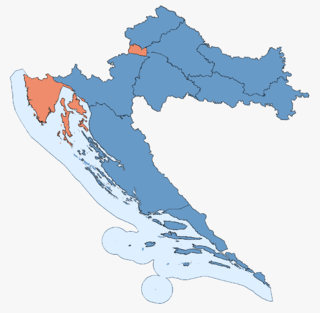
Parliamentary elections to elect all 151 members of the Croatian Parliament were held on 23 November 2003. They were the fifth parliamentary elections to take place since the first multi-party elections in 1990. Voter turnout was 61.7%. The result was a victory for the opposition Croatian Democratic Union (HDZ) which won a plurality of 66 seats, but fell short of the 76 needed to form a government. HDZ chairman Ivo Sanader was named the eighth Prime Minister of Croatia on 23 December 2003, after parliament passed a confidence motion in his government cabinet, with 88 MPs voting in favor, 29 against and 14 abstaining. The ruling coalition going into the elections, consisting of the Social Democratic Party (SDP), Croatian People's Party (HNS), Croatian Peasant Party (HSS), Party of Liberal Democrats (Libra) and the Liberal Party (LS), did not contest the elections as a single bloc; the SDP ran with the Istrian Democratic Assembly (IDS), the Party of Liberal Democrats (Libra) and the Liberal Party, HNS ran with the Alliance of Primorje-Gorski Kotar (PGS) and the Slavonia-Baranja Croatian Party (SBHS), while HSS ran on its own.

The Croatian Parliament or the Sabor is the unicameral legislature of the Republic of Croatia. Under the terms of the Croatian Constitution, the Sabor represents the people and is vested with legislative power. The Sabor is composed of 151 members elected to a four-year term on the basis of direct, universal and equal suffrage by secret ballot. Seats are allocated according to the Croatian Parliament electoral districts: 140 members of the parliament are elected in multi-seat constituencies. An additional three seats are reserved for the diaspora and Croats in Bosnia and Herzegovina, while national minorities have eight places reserved in parliament. The Sabor is presided over by a Speaker, who is assisted by at least one deputy speaker.

New Slovenia – Christian Democrats is a Christian-democratic, conservative political party in Slovenia. Since 2018, it is led by Matej Tonin. The party was formed on 4 August 2000 following a split in the unified Slovenian People's Party and Slovene Christian Democrats (SLS+SKD). NSi is a member of the European People's Party (EPP) and in the European Parliament its MEP Ljudmila Novak sits with the EPP Group. At the most recent Slovenian parliamentary election in 2022, NSi secured 6.86% of all votes, thus gaining 8 seats in the National Assembly.

The Social Democrats is a centre-left and pro-European social-democratic political party in Slovenia led by Tanja Fajon. From 1993 until 2005, the party was known as the United List of Social Democrats. It is the successor of the League of Communists of Slovenia. As of 2022, the party is a member of a three-party coalition government with Robert Golob's Freedom Movement alongside The Left, as well as a full member of the Party of European Socialists and Progressive Alliance.

The Democratic Party of Pensioners of Slovenia is a political party in Slovenia led by Ljubo Jasnič. The party claims broadly liberal values with a strong focus on the interests of the retired and the elderly. Despite being part of virtually every governmental coalition of Slovenia since it started appearing on voting ballots, the party only secured 0.66% of all votes at the most recent Slovenian parliamentary election in 2022 and thus failed to secure any seats in the National Assembly.
Regular elections in Croatia are mandated by the Constitution and legislation enacted by Parliament. The presidency, Parliament, county prefects and assemblies, city and town mayors, and city and municipal councils are all elective offices. Since 1990, seven presidential elections have been held. During the same period, ten parliamentary elections were also held. In addition, there were nine nationwide local elections. Croatia has also held three elections to elect members of the European Parliament following its accession to the EU on 1 July 2013.
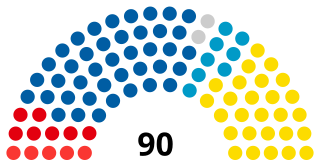
The National Assembly, is the general representative body of Slovenia. According to the Constitution of Slovenia and the Constitutional Court of Slovenia, it is the major part of the distinctively incompletely bicameral Slovenian Parliament, the legislative branch of the Republic of Slovenia. It has 90 members, elected for a four-year term. 88 members are elected using the party-list proportional representation system and the remaining two, using the Borda count, by the Hungarian and Italian-speaking ethnic minorities, who have an absolute veto in matters concerning their ethnic groups.

Parliamentary elections were held in Slovenia on Sunday, 3 October 2004 to elect the 90 deputies of the National Assembly. A total of 1,390 male and female candidates ran in the election, organized into 155 lists. The lists were compiled both by official political parties and the groups of voters not registered as political parties. Five candidates applied for the seat of the representative of the Hungarian "national community" and only one candidate applied for the seat of the representative of the Italian national community. In the previous election (2000), fewer than 1000 candidates on 155 lists applied.
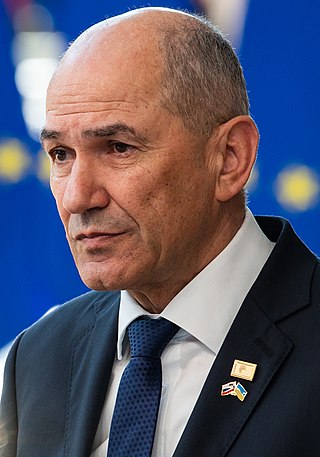
Ivan Janša, baptized and best known as Janez Janša, is a Slovenian politician who served three times as a prime minister of Slovenia, a position he had held from 2004 to 2008, from 2012 to 2013, and from 2020 to 2022. Since 1993, Janša has led the Slovenian Democratic Party, which has emerged as the pre-eminent Slovenian conservative party. Janša lost his fourth bid for prime minister in April 2022, his party defeated by the Freedom Movement party.
Elections in Hungary are held at two levels: general elections to elect the members of the National Assembly and local elections to elect local authorities. European Parliament elections are also held every 5 years.
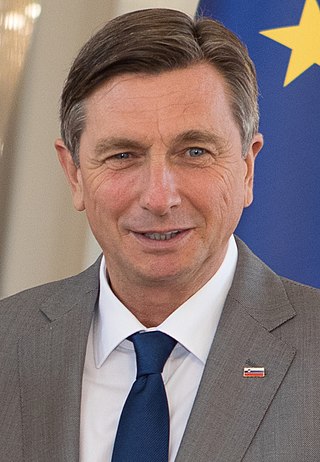
Borut Pahor is a Slovenian politician who served as President of Slovenia from 2012 to 2022. He previously served as Prime Minister of Slovenia from November 2008 to February 2012.

Parliamentary elections were held in Croatia on 25 November 2007 and for overseas voters on 24 and 25 November. The campaign officially started on 3 November. The President of Croatia announced elections on 17 October and 14 days were allowed for candidate lists to be submitted.
The Government of the Republic of Slovenia exercises executive authority in Slovenia pursuant to the Constitution and the laws of Slovenia. It is also the highest administrative authority in Slovenia.
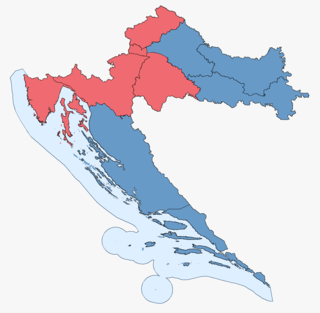
Parliamentary elections were held in Croatia on 8 November 2015. All 151 seats in the Parliament were up for election. This parliamentary election was the 8th since the first multi-party election in 1990 and the first since Croatia joined the European Union in 2013. The ruling center-left Croatia is Growing coalition, led by Prime Minister Zoran Milanović, was challenged by the center-right Patriotic Coalition led by the HDZ and headed by its party chairman Tomislav Karamarko, and also faced several new political coalitions.
Parliamentary elections were held in the SR Slovenia on 8 April 1990, together with the first round of presidential elections.
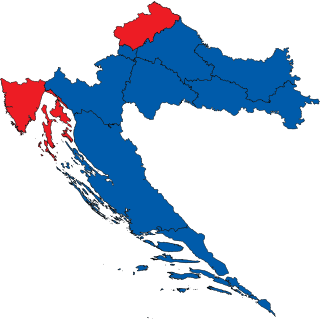
Parliamentary elections were held in Croatia on 5 July 2020. They were the tenth parliamentary elections since the first multi-party elections in 1990 and elected the 151 members of the Croatian Parliament. 140 Members of Parliament were elected from geographical electoral districts in Croatia, three MPs were chosen by the Croatian diaspora and eight MPs came from the ranks of citizens registered as belonging to any of the 22 constitutionally recognized national minorities.
Presidential elections were held in Slovenia on 22 October 2017. Nine candidates ran in the first round of the elections, in which the incumbent independent President Borut Pahor placed first and Marjan Šarec of the List of Marjan Šarec (LMŠ) placed second. No candidate received a majority of the vote in the first round, resulting in a run-off between Pahor and that was held on 12 November 2017. Pahor won the run-off with 53% of the vote; voter turnout in the second round was 42.13%, the lowest in any presidential election since independence.
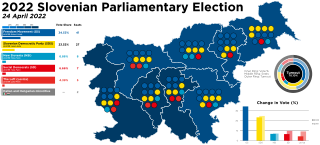
Parliamentary elections were held in Slovenia on 24 April 2022 to elect all 90 members of the National Assembly.